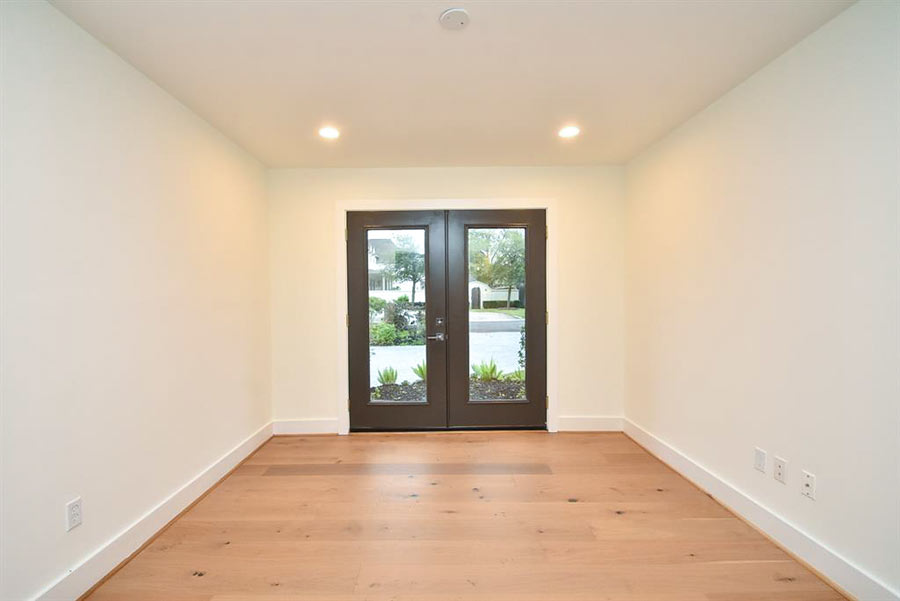KITCHEN ETHICS: PERMIT OR NO PERMIT? “I’m not sure who to go to on this, but I live in Eastwood and am doing a total upgrade of my kitchen. I’m going back and forth on whether to go through the city permit process or not . . . am trying to figure out the pros and cons. We have guys doing the construction that will work with us either way on it. Any thoughts?” [Swamplot inbox]




If you have a reasonable amount of construction and remodeling knowledge, as well as a solid amount of trust (and oversight) in your contractor, involving the burdensome city permit process is almost always avoidable. On the other hand, if you don’t have knowledge and experience in remodeling, coupled with a limited amount of trust in your contractor, involving an entity like the city’s permitting department can help keep the contractor on the up and up… helping to assure the homeowner that everything that should get done, is done.
Screw the city. Do it without a permit. Just make sure your contractors throw all their trash out on a regular basis. City has inspectors that just drive around looking for construction without permits….but you can hide it from them if you just don’t have a pile of trash in front of your house.
If you blow off the City, be sure to hire a good inspector to review the job before you sign off on the final draw. Kitchens have plumbing (water and gas) and electronics that if not properly installed can lead to very expensive repairs and possibly dangerous conditions. My uncle had a kitchen redone and was almost electrocuted by an exhaust hood that was improperly wired.
Also, if you do not permit, you do run the risk of getting shut down if a City inspector figures out what you are up to.
The cost of a permit is not that much. The cost of bad construction…priceless.
The city doesn’t really have inspectors who drive around looking for bootleg projects. They have to inspect something like 20 projects a day.
But if you have a neighbor who is hateful, they may turn you in.
When we purchased a remodeled home in the Heights, we pulled all the permits on it to make sure it was up to date with the city. We actually withdrew an offer for another house because of the lack of permitted additions/remodel as it could mean tax implications for us if the city ever found out. Just a thought that it might be an issue on resale.
It’s not just shoddy construction you have to worry about: it’s also fire. Codes are written to outlaw unsafe construction. There are dozens of things you’d never notice or think of that can cause a fire that are not allowed by code.
@artsgirl: If your inspector finds no problems… what is the problem? The only “tax implications” are getting your taxes increased to what they should be rather than an artificially low rate. The house that you bought that was up to date with permitting is getting taxed at its real value every year versus the house you pulled your offer from could probably go a few more years at a lower rate. They don’t come back and get the money they missed…
Anyways, which ever route you take it you really should have an agreement with your contractor that an independent entity (or person) inspect the work that knows what to look for. Otherwise you may give an incentive for your contractor to cut corners. Telling your contractors that you don’t want it permitted already tells them that you are willing to cut some corners…
What artsgirl said. We recently pulled out of an in-progress-purchase when we found out a major addition to a 1940s house was done without a permit.
I’m not going to advise you to do anything illegal, so I’m not going to advise you at all.
Plus don’t forget, it’s not the cost of the permit, that’s pricy, it’s the increase you will have to your property taxes, every year after.
Get the permits. It’s not that hard (your contractor should be the one doing that anyway) and you’ll be glad when you go to sell the house. See artsgirl’s comment for example. If you don’t have permits for the work you will have to lie on your seller’s disclosure sheet which opens up a whole other can of worms if you have a smart buyer.
The city inspector on our project last year noticed our neighbor’s remodeling work (no hateful tattletaling on our part) and red-tagged his project. That was unfortunate for him, I’m sure, plus $$$ in fees.
Licensed plumbers and electricians know the city inspectors and while they might gripe about scheduling an inspection etc. they know how to get the job done so you get a pass. If you’re not working with licensed plumbers or electricians well, good luck to you.
In my experience, city permits have overrun my budget on several projects, upwards of several thousand dollars, between the extra work and fees.
One problem I’ve had is that the city expects you to get a separate permit for each type of work. So for a typical kitchen remodel, you would have to pull plumbing, framing, and electrical permits – each costing around $180, and each handled by a separate inspector. That’s $540 just for the fees, not including extra materials and labor you will pay for fixing the nit picky (and unbudgeted) issues they will add on to the project. Some of those issues will be good catches, but most will be BS that the inspector uses to justify the existence of their job.
I’ve had inspectors cite me for issues outside the scope of the permit. For example, one inspector refused to pass my new gas piping system until I installed an emergency valve on my electric hot water heater. In that instance, I planned on redoing the entire plumbing system the following year, but had to pay my plumber to install the valve on a water heater that I junked a year later.
Also, permits expire every 180 days and must be extended for another fee. So if you have a drawn out project, they get you that way, too.
When I got new gas lines and new electrical service, I had no choice but to pull the permits because Centerpoint and the city are in cahoots – one won’t activate the meter without the blessing of the other.
If you are doing work in incremental steps over time (like I am on my gradual renovation of a 70 year old home), then avoid permits on any minor work, but get them on majors (like gas and electrical), because that’s what cautious buyers will look for.
I also had one contractor tell me about how they would store the debris in the garage, then get a dumpster dropped off and picked up on the same Saturday to avoid the inspectors.
Doing major work without a permit is simply – dumb. The people griping about permits are usually shady contractors who don’t want their work inspected; slumlords who have no problem putting tenants lives at risk with substandard electrical and gas line work; and people who are naive enough to believe those who say that saving $500 on $25K job is a good idea. Selling your house without permit documentation will be difficult, and if there is EVER a serious problem and you need to actually use your homeowner’s insurance – be prepared for a shock when they decline to pay because you didn’t have the work inspected and permitted. Bottomline: If you can afford the remodel, you can afford the permitting process. If not, save your money until you can afford to do it right.
I remodeled a kitchen in ’09 (granite, cupboards, backsplash) followed by new flooring (stone & wood) in ’10. Never applied for permits. Now am selling. In Seller’s Disclosure I state what was upgraded and use market prices from Comps, which is how you set prices generally speaking. I have no regrets.
But as you’re just heading out with a project, I recommend permits (yes, I don’t walk the talk) for reasons cited by others.
The times we’ve bought a house, I’ve always followed a lawyer friend’s advice and (where it’s not on the existing disclosure) asked the seller of any house we wanted to make an offer on to sign a statement that there is no unpermitted work, making clear that lying is a violation of the Texas Deceptive Trade Practices Act, which lets you recover triple damages and attorney’s fees. Besides, if the seller isn’t happy about signing the disclosure, there’s probably other stuff he’s hiding.
I have bought and sold houses and never asked or was asked whether any of the work was permitted. The house either passes the buyer’s inspection or it doesn’t.
I permitted raising the floor in my living room. The inspector wouldn’t pass the change because he said I didn’t have enough smoke detectors in the house.
No good deed goes unpunished.
Bedmonson, the unpermitted addition added nearly 800 square feet to the house which hadn’t been documented by HCAD. We are advised that legally, even though the addition was 25 years old, we would be responsible for any of the back taxes on the property if the city ever figured out that the 1400 sq foot house on its rolls was nearly 2200 sq foot. It’s one thing to have to pay higher taxes going forward if one makes an addition, it’s another having to pay 25 years in back taxes.
While we didn’t think it was likely we’d be turned in, given the amount of time that had passed, we decided it wasn’t worth the risk, especially since we couldn’t be sure of the quality of the plumbing/electric etc. I should note that the sellers did disclose that the addition was unpermitted.
My first reaction would be to say “Hell no”. But the real reply would go to what others have said. It really depends on the scope of work and how comfortable you feel with your contractor. If you have never done anything like this and hired some unknown guy on Craigslist, get the permit.
.
Getting permits will cost you more than just the extra permit fees as you’ll likely get busted for other unrelated stuff (I could type for days on this but others have given examples already)
.
Technically you need permits for some simple and dumb stuff. So for 90% of people that would be doing a remodel, I’d say don’t bother. However if you have money to burn and want to go the safe/conservative route, just do it.
.
If you do get the permit, share your experience with us. :)
Yeah buddy. The damn city just looking for a hand out like Obama. The ten grand I spend on property taxes should cover the cost of these here permits. Let me know.
BC
Arts girl, that can’t be right. Who told you that you would be responsible for back taxes? Does anyone know either way beccause lots of people in the heights live in houses with unpermitted additions and I have never heard of this being a concern or actually happening.
I have a friend caught up in YEARS of court drama over an unpermitted garage apartment in the Heights area. The HOA got involved and the whole thing is a a hot mess.
The city is most definitely trying to get the back taxes. I haven’t heard of the city winning something like this, but I don’t see why they can’t. As a taxpayer, I hope they do.
We’ve had some work done the last couple of years. For the new sewer, new water piping, and new driveway (required after digging up the sewer), the inspectors came out and looked at everything. The driveway guys had to put some more steel in the curb area, but the rest passed without incident. I think the inspections make the contractors be more careful about what they are doing.
For the windows, the inspectors never came out.
I was surprised that one plumber we asked out for a quote said “permits? If you want, we’ll get one, but normally we blow that off”. Given the ease with which a business can lose a license, that was a bit of a shock.
I have small job : exterior door
It cost about $200 if I “Do it yourself”
But when i ask permit and everything to finish the job . It cost up $1600-$2200
What do you think? Very hard for people want to live legally !